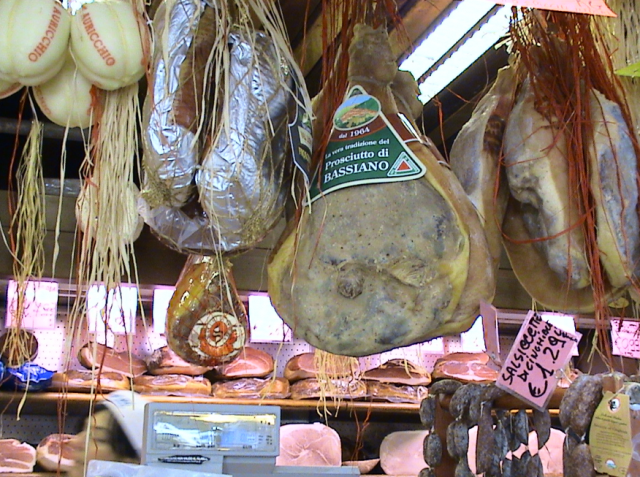
Sitting next to two vegetarians and seven meat eaters, I listened critically to a voracious debate about the difference between meat consumption in Italy and the United States. Surrounded by the mountains and countryside of Italy’s Tuscany region, we had just finished a delicious meal consisting of freshly sourced meat from the farm right outside the window amongst other fresh ingredients that composed one of the best meals of my life. As fresh food remains a staple in Italian culture, the two American vegetarians vented about their disdain for the meat industry in the United States, listing common facts about the lack of cleanliness and ethics in America’s meat industry. The Italian meat eaters responded by showcasing the juxtaposition of each culture’s attitude toward meat. While it is normal for most Americans to be clueless about the source of their meat and eat whatever is sold at the grocery store, most Italian families maintain close relationships with their butchers and know the farms from which their meat came. Not to mention, it is normal for most Italians to slaughter an animal for dinner at least once in their life to appreciate the animal from which their meat came and to discourage buying excess beyond what a family can eat.
Totally different values and clearly one is more effective than the other. As most Americans recklessly buy meat at the grocery store without knowing the source of their meat, can we truly be surprised at the detrimental state of the meat industry due to a lack of accountability? As previously mentioned, Italians grow up knowing their butcher, thus creating a relationship in which the butcher knows they will be held responsible for the quality of meat sold. Not only is fresh and organic the standard, but if anything goes wrong the butcher knows that their reputation and career are on the line. It’s difficult to create that type of relationship with major meat sellers, such as Shoprite or Stop and Shop.
While I recognized that America’s meat industry had serious flaws, both ethically and health wise, I had not considered that prior to that meal in Italy, I had never met the provider of my meat. Growing up in a New Jersey suburb, I rarely engaged with any butcher beyond an occasional lunchmeat sale. I certainly could not tell you the name of the farm that raised my meat. And killing a cow or chicken myself was out of the question.
I quickly realized that my ignorance and nonchalance toward meat preparation from slaughter to sale, along with other Americans, collectively facilitated a lot of the health ills plaguing the American meat industry. Although I did not become vegetarian until recently, that dinner conversation in Italy sparked a higher level of personal concern for America’s meat eating culture.
How many Americans know the source of their meat? Not the grocery store, but the actual butcher that slaughtered and cleaned the animal to prepare it for sale. How many Americans actually have killed an animal for dinner? Or even witnessed it to understand the process? Beyond a grocery store complaint or hopeless report to the U.S. Food and Drug Administration, can Americans truly get justice for contaminated or low quality meat products? The bureaucracy of America’s meat industry makes it nearly impossible for the majority of consumers to pinpoint the slaughterhouses and farms from which their meat came. And regardless, Americans have no problem consuming “anonymous” meat on a daily basis. Maybe we deserve what we get.
When Americans get sick from bad meat sales, they blame the restaurant or grocery store provider. Why not the butcher or slaughterhouse? Where is the accountability standard for the actual source? While the FDA’s regulations prevent the United States’ meat industry from feeding people just anything, it cannot enforce ethics in the same capacity as Italy’s locally sourced eating culture.
Recently, researchers concluded that 47% of America’s meat and poultry are contaminated with antibiotic-resistant Staphylococcus aureus. Perhaps, it is time for Americans to buy their meat directly off the farm to heighten the level of accountability or simply stop eating it. Change is imminent unless you’re willing to sacrifice your health.







There is good and bad about knowing where your meat is coming from. When I was a child my family, in a suburban area of Los Angeles, I.e. Compton, raised chickens, rabbits, turkeys and some times hogs for foods along with crops of veggies. Lucky me I could work after school in a garden, instead of play baseball, like the other kids.
I admit that the freshly killed meat from our chickens for Sunday dinner tasted far superior to anything I can buy in the store, even whole food stores, but also while I was young my family did not own a car and I had ride the bus to the county hospital with my mother which was cool until we passed Farmer John’s slaughter and packing house. The smell of that place permeated everything near and turn me off to Farmer John’s meat so that I cannot eat that brand even as an adult. So much for local brands and besides now the animals aren’t locally grown any more.
So in a large urban setting it’s difficult to really know where your food is coming from unless you have some land and want to work it yourself. Also there aren’t many farm as close by, so you’re stuck with trusting your whole foods retailers.
A well written and thoughtful article about the state of interpersonal relationships and food. My one caveat to the discussion is a lack of education on the American front about the politics BEHIND the food. A lot of Americans are unaware of the stranglehold that big, food producing corporations have on the ability of the American government to reform many food producing industries.
I love Italian food culture, and Italy in general, but it is a much smaller country with much smaller industries (in comparison to the United States) therefore it is both more manageable and culturally ingrained that such a relationship between food origin and food on the table should exist.
I would argue that a large number of Americans are aware that something is not right as far as meat goes, but that the problem comes from difficulty knowing how to redefine consumer culture and how to battle big corporations who continue to dictate what standard of food consumers should be accepting (which is ridiculous!)
I would also add finally that there’s a growing movement of people contracting directly with farms to get locally grown produce and locally raised livestock. It’s a small and elite number of people, but it’s a start! I know that there’s a farm in upstate New York that interacts directly with individual families and a small number of restaurants to provide ethically raised and humanely slaughtered animals.
Thanks so much for bringing in the multi-cultural perspective to the meat vs. veg debate!!
Wow…
The human relationship with animal flesh is absolutely muddled even in a romantic country such as Italy. This wonderfully written article much like the cute book/movie Eat Pray Love, but the facts remain Italians, as well Americans, eat meat for purely pleasurable reasons, not for nourishment, and none that have to do with compassion for the animals. NOT ALL, but most meat-eaters have bought most, if not all, the meat propaganda (we need it for protein).
No one sits back and reflects on all the propaganda we get from food corporations and our own Western CULTURE–which has to reinforce it’s habits in order to survive, however damaging they are to the next generation–to justify our living outside of tropical zones, where our natural diet originates. Italians do not eat what the can catch with their hands (rodents) because they’re not considered “good” meat. They eat some of the filthiest animals (pigs, birds) and largest (cows), but since they have this great tradition with food, they get a pass for producing meat that is largely hormone and disease free.
Yes America is the gut-bucket of all food consumption, mainly because we are the easiest to trick with a bargain, but seriously, the problem lies in the notion that first-world countries sign of affluence is the consumption of meat.
I am not vegan because I think it will change the world, but I am a vegan because it’s the responsible human should eat as much as one’s budget can handle. I really did enjoy the article, but please, let’s not get confused about the whether meat consumption is healthy or not. Meat consumption is an exploited myth of our scavenger (hunter-gather if you want to be romantic) past.
I think that this is an unfair comparison, and let me tell you why. America has a food culture based on wealth and class-ism, not on regionalism cultural heritage. In Italy, food is a way of life that benefits all the people (a socialist concept), in America it’s all about where you live and what you can afford. Are there any “Whole Foods” in “black neighborhoods”? I have never heard of one. When black folks left the fields and went into the rest of the world, it helped and hurt us at the same time. It helped us to push against an unjust system, but we also lost control over where our food came from and what we eat.
As a culinary adviser and Chef for over 20 years, I know that our young African American culinary students don’t get the same opportunities to go to France and Italy. I am working with a hospitality company from Belgium that wants to actively recruit students, but they also need support in this country with farm to table concepts. We also need to celebrate a cuisine in “Soul Food” that is diverse, and we don’t. If you are a black chef (even Chef Marcus Samualsson) you are pigeonholed as a “Soul Food” chef, a label that most of don’t mind, but that is many time in accurate.
The answer to this is mentorship with young black chefs. I work to do this and I feel it’s our future. As far as anything else, I would challenge Jamie Olivier to go to Watts and see what people get to eat there! Go to a “Lucky’s” in East LA and see the quality of what people get to eat. Most people drive miles to get to “good food”. We are in 2 (ok maybe 3) wars, and yet we have not been asked, like my grandparents, to have “victory gardens”. Grocery are a sign (in the rest of the world) of our laziness when it comes to food!
I’m kind of late to the party here, but great post and comments. I was in Italy recently and ate lots of meat, something I don’t do at home in the States. Michael Pollans book, THE OMNIVORE’S DILEMMA changed everything for me. I was considering all this when I was in Italy, wondering about their meat production system and even their cultural connections with the food they eat and feed their loved ones. Thanks for the info and thanks to all the comments–very thoughtful and informed from multiple view points. I wish more Americans thought about these issues, but as one of you pointed out, we love a bargain…